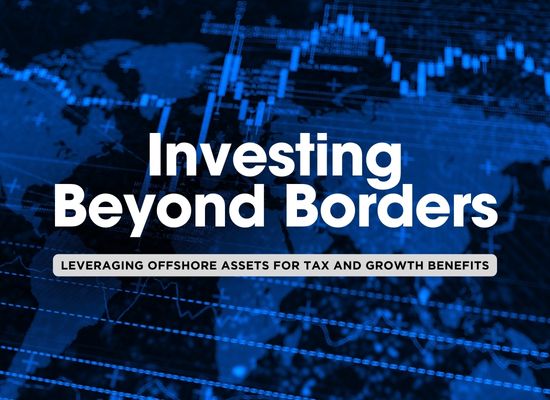Diversification Beyond Borders: The Case for Offshore Portfolios

In today’s interconnected world, investors are increasingly looking beyond their domestic markets to build diversified portfolios that can weather economic storms. Offshore investing offers unique opportunities to broaden investment horizons, access high-growth regions, and mitigate risks tied to specific countries or industries. By spreading assets across borders, investors can take advantage of favorable tax policies, emerging markets, and international asset classes that may not be available in their home country.

1. Global Economic Exposure and Risk Mitigation
✅ Why Diversification Matters
- The core principle behind diversification is simple: don’t put all your eggs in one basket. But the idea becomes even more critical when applied to global economic exposure. By investing offshore, you can reduce the risk tied to the economic performance of a single country or region.
💡 Example:
- If you’re heavily invested in the stock market of your home country, a recession or political instability could negatively impact your wealth. However, by spreading investments across global markets, you’re less vulnerable to one country’s economic downturn.
✅ Global Markets Provide Stability
- Offshore portfolios can help mitigate risks by including assets from different countries, industries, and currency markets. This global approach allows investors to take advantage of opportunities in regions that are growing, while balancing out the risk of those that might be stagnating.
2. Access to Emerging Markets and High-Growth Regions
✅ Tapping Into High-Growth Opportunities
- Offshore investments provide access to emerging markets, where economic growth is often higher than in developed countries. These markets present significant opportunities in industries like technology, infrastructure, and consumer goods, where returns can outpace those in traditional, developed markets.
💡 Example:
- Countries in Southeast Asia, Africa, and Latin America often experience faster growth due to industrialization, growing populations, and rising incomes. By investing offshore, you can tap into these high-potential markets before they reach maturity.
✅ Diversification into Non-Correlated Assets
- Different global markets are influenced by various factors—whether political, environmental, or social. By accessing offshore portfolios, investors can gain exposure to non-correlated assets, meaning that the performance of these investments doesn’t always align with the movements of their domestic markets. This further reduces volatility and creates more stable returns.
3. Access to Favorable Tax Policies and Regulatory Benefits
✅ Tax Optimization Through Offshore Investments
- One of the primary motivations for going offshore is the tax advantages that certain jurisdictions offer. Many countries or regions provide tax incentives designed to attract foreign investors. These can include lower capital gains taxes, tax exemptions on certain income, and more favorable treatment for investments in specific sectors.
💡 Example:
- Jurisdictions like the Cayman Islands or Singapore have tax policies that make them appealing to investors seeking to optimize their returns by minimizing tax burdens. In these places, you can often find tax-free zones for investments, reducing the overall tax liability.
✅ Regulatory Flexibility
- Offshore investment destinations often provide less stringent regulations, giving investors more freedom in terms of investment strategies and portfolio management. While regulations exist to ensure fair practices, they’re generally designed to encourage foreign capital, offering more flexibility compared to stricter domestic laws.
💡 Example:
- Some offshore jurisdictions allow for less reporting of capital movements, protecting investor privacy and allowing for faster investment transactions. This flexibility can enhance the speed at which you can act on market opportunities, a luxury not always possible in highly regulated markets.
4. Protection from Domestic Instability and Currency Devaluation
✅ Safeguarding Wealth from Political and Economic Instability
- Offshore investments can be an important tool for protecting wealth from domestic instability. Political turmoil, government policy changes, or economic crises can severely impact local markets and the value of your assets. By holding a portion of your investments offshore, you can shield your portfolio from the volatility of your home country’s economy.
💡 Example:
- Countries with unstable political climates or currencies, like Venezuela or Argentina, have seen inflation rates skyrocket, severely affecting the purchasing power of local assets. In such cases, holding investments in stable offshore markets like Switzerland or Hong Kong can protect your wealth from devaluation.
✅ Currency Hedging
- Offshore investing allows you to gain exposure to foreign currencies, which can act as a hedge against the devaluation of your home currency. If your local currency experiences inflation or a drop in value, investments in stronger, more stable currencies can act as a buffer to preserve your purchasing power.
💡 Example:
- If you’re based in a country with an unstable currency (e.g., the Turkish Lira or South African Rand), investing in offshore markets that deal with stronger currencies like the US Dollar or Euro can safeguard your portfolio against domestic currency depreciation.
5. Expanding Investment Opportunities Beyond Traditional Assets
✅ Diversifying Into Alternative Asset Classes
- Offshore portfolios give investors access to alternative investments that may not be readily available in their domestic markets. These can include private equity, hedge funds, venture capital, and even art or rare collectibles. These alternative assets often carry less correlation to traditional investments, such as stocks and bonds, offering greater protection against market volatility.
💡 Example:
- Investors looking to diversify beyond traditional stocks and bonds might consider offshore markets with access to private equity funds or hedge funds focused on emerging industries like biotechnology or sustainable energy. These assets can offer higher returns, although they come with their own risks.
✅ Investing in Global Real Estate
- Offshore investment provides access to high-growth real estate markets in other countries. Investing in property overseas can offer exposure to different real estate cycles and provide opportunities in rapidly growing areas like Asia, Africa, or Eastern Europe. This kind of diversification can help spread risks while generating significant returns.
💡 Example:
- A real estate investor in the U.S. might look to purchase luxury properties in Dubai or commercial real estate in Mexico City, where the real estate market may offer higher yields and growth potential than domestic markets.
6. Wealth Preservation Through Offshore Asset Protection
✅ Legal Protection from Domestic Creditors
- One of the most appealing features of offshore investing is the asset protection benefits. By holding investments in offshore accounts or jurisdictions with favorable asset protection laws, investors can shield their wealth from creditors, lawsuits, or legal actions in their home country. Offshore trusts and companies often offer enhanced privacy and can provide a safeguard against domestic financial risks.
💡 Example:
- If you’re concerned about potential lawsuits or creditor claims, placing assets in a jurisdiction like the Cook Islands or Nevis—known for their robust asset protection laws—can help protect your wealth from being seized by creditors in your home country.
✅ Offshore Trusts for Long-Term Wealth Protection
- Offshore trusts are widely used for estate planning and wealth transfer. These trusts can protect assets, provide privacy, and help manage the distribution of wealth across generations, ensuring your legacy is preserved and efficiently passed on to heirs. They can also minimize estate taxes, especially in countries with high estate or inheritance tax rates.
💡 Example:
- A family with significant wealth might establish an offshore trust in a jurisdiction like Jersey or the Isle of Man, which offers flexible estate planning options and favorable tax treatment, ensuring that assets are securely transferred to the next generation without high tax burdens.
7. Building a Robust Offshore Investment Strategy
✅ Assessing Your Investment Goals and Risk Tolerance
- Before diving into offshore investments, it’s essential to define your investment goals and understand your risk tolerance. Offshore investing offers a wide range of opportunities, from high-risk, high-reward ventures in emerging markets to more stable investments in developed countries. By aligning your strategy with your goals—whether that’s capital preservation, growth, or income generation—you can craft a tailored approach that suits your financial needs.
💡 Example:
- If your goal is long-term wealth preservation with minimal risk, focusing on more stable offshore assets like real estate or government bonds in well-established jurisdictions might be your best bet. Conversely, if you’re seeking high returns, you may want to explore venture capital or private equity opportunities in emerging markets.
✅ Choosing the Right Offshore Jurisdiction
- The choice of jurisdiction plays a crucial role in your offshore investment strategy. Different countries offer various benefits, including tax incentives, asset protection, and regulatory advantages. It’s important to research jurisdictions thoroughly, taking into account factors like political stability, economic growth potential, and the specific legal frameworks governing offshore investments.
💡 Example:
- If you’re looking to invest in global real estate, jurisdictions like Monaco or Switzerland may offer both stability and tax advantages. On the other hand, if you’re aiming for privacy and robust asset protection, jurisdictions like the Cayman Islands or Bahamas could be ideal.
8. How to Get Started with Offshore Investing
✅ Start with a Trusted Advisor or Wealth Manager
- Offshore investing can be complex, so it’s important to work with a trusted advisor who specializes in international wealth management. A skilled advisor will help you navigate the legal, financial, and logistical aspects of offshore investing, ensuring that you choose the right assets and jurisdictions to meet your specific needs.
💡 Example:
- If you’re considering an offshore trust, an advisor with expertise in estate planning can guide you on selecting the right jurisdiction, setting up the trust, and ensuring that your assets are protected and efficiently transferred to future generations.
✅ Consider Diversification and Asset Allocation
- As with any investment strategy, diversification is key to mitigating risk. When creating your offshore portfolio, aim to spread your investments across different asset classes, regions, and industries. This diversification will not only reduce your risk but also open up opportunities for higher returns in various sectors.
💡 Example:
- A well-diversified offshore portfolio could include international stocks, real estate, bonds, and alternative investments like private equity. By allocating assets across these areas, you can take advantage of different global growth cycles and reduce the risk of being overly exposed to any single market.
9. Common Pitfalls in Offshore Investing and How to Avoid Them
✅ Lack of Thorough Research
- One of the most common mistakes in offshore investing is failing to conduct thorough research on potential jurisdictions, asset classes, or investment managers. Not all offshore markets are the same, and each comes with its own set of risks, regulations, and benefits. Rushing into investments without fully understanding the market or the local legal framework can lead to poor decisions and significant losses.
💡 Example:
- Before investing in a foreign real estate market, it’s essential to research property laws, taxes, and ownership rights in that country. Skipping this step can result in losing control of assets or being caught in complex legal disputes.
✅ Overlooking Compliance and Legal Requirements
- Offshore investing often involves strict legal and regulatory requirements, especially when dealing with cross-border investments or setting up offshore structures like trusts or holding companies. Failing to comply with the local laws can result in penalties, asset freezes, or even loss of investments. It’s crucial to be aware of reporting obligations and tax liabilities that may arise from offshore investments.
💡 Example:
- Some countries, such as the U.S., require citizens to report foreign bank accounts or investments over a certain threshold. Failing to comply with these reporting regulations can result in hefty fines and legal issues.
10. Tips for Long-Term Success in Offshore Investing
✅ Regularly Review Your Offshore Portfolio
- Just like any investment portfolio, offshore investments require regular monitoring to ensure they are performing as expected. Changes in international markets, political climates, or currency values can affect the performance of your offshore assets. By reviewing your portfolio regularly and making adjustments as needed, you can ensure your investments stay aligned with your financial goals.
💡 Example:
- If the economy in a particular country starts to slow down or political instability rises, it might be a good idea to shift investments to more stable offshore markets or diversify further into other regions.
✅ Stay Informed About Global Economic Trends
- Keeping up with international economic trends and global events can provide valuable insights into where to allocate your offshore investments. Factors like interest rate changes, currency fluctuations, and trade policies can have a significant impact on offshore investments, especially in emerging markets.
💡 Example:
- If you know that a country is experiencing a boom in infrastructure development or technological innovation, you may want to increase your exposure to that market by investing in relevant sectors, such as construction, technology, or energy.
By staying proactive, informed, and flexible in your approach, you can maximize the potential of offshore investing and secure long-term growth for your wealth. With proper planning, diversification, and the right guidance, offshore investing can be an essential part of a successful global wealth management strategy. 🌍💼
Table Summary
| OffshoreOpen: Offshore Investment Strategy Summary | |||
|---|---|---|---|
| Aspect | Details | Example | Benefit |
| Global Economic Exposure | Offshore investing spreads risk across different countries, minimizing the impact of local economic downturns. | Investing in European and Asian markets while residing in the U.S. | Protection from domestic recessions, inflation, and political instability. |
| Access to Emerging Markets | Offshore investing provides opportunities in high-growth markets that have higher potential returns. | Investing in technology stocks in Southeast Asia. | Exposure to fast-growing industries with higher returns than traditional markets. |
| Favorable Tax Policies | Certain offshore jurisdictions offer tax incentives like reduced capital gains taxes and tax exemptions on some income types. | Investing in real estate in the Cayman Islands. | Reduced tax burden, leading to higher after-tax returns on investments. |
| Currency Devaluation Protection | Offshore investments in stable foreign currencies help protect against local currency devaluation. | Holding assets in U.S. dollars or Swiss francs while living in a country with a weaker currency. | Preservation of wealth in the face of domestic currency instability. |
| Diversification into Alternative Assets | Offshore investing provides access to alternative assets like private equity, hedge funds, and international real estate. | Investing in private equity in emerging tech companies or commercial properties in London. | Greater diversification beyond traditional stocks and bonds, which can lower risk and provide better returns. |
| Asset Protection | Offshore structures like trusts or holding companies offer protection from creditors and lawsuits. | Using a trust in the Cook Islands to protect assets from potential lawsuits. | Safeguarding assets from legal disputes and financial claims in the home country. |
| Investment Goals Alignment | Offshore investing allows you to align investments with specific goals, whether for wealth growth, income generation, or capital preservation. | Choosing real estate for long-term capital appreciation and stocks for short-term growth. | Tailored investment strategies that match your personal financial goals. |
| Legal and Compliance Considerations | Offshore investing comes with regulatory obligations, such as tax reporting and compliance with international financial laws. | Filing necessary tax forms for foreign assets in the U.S., like the **FBAR** or **FATCA** disclosures. | Ensures compliance and avoids potential legal or financial penalties. |
| Advisory Support | Expert advice from offshore wealth managers or investment advisors is essential for navigating complex international laws and markets. | Consulting with an advisor to set up an offshore trust in a tax-friendly jurisdiction. | Guidance on investment selection, compliance, and minimizing risks to ensure better financial outcomes. |



